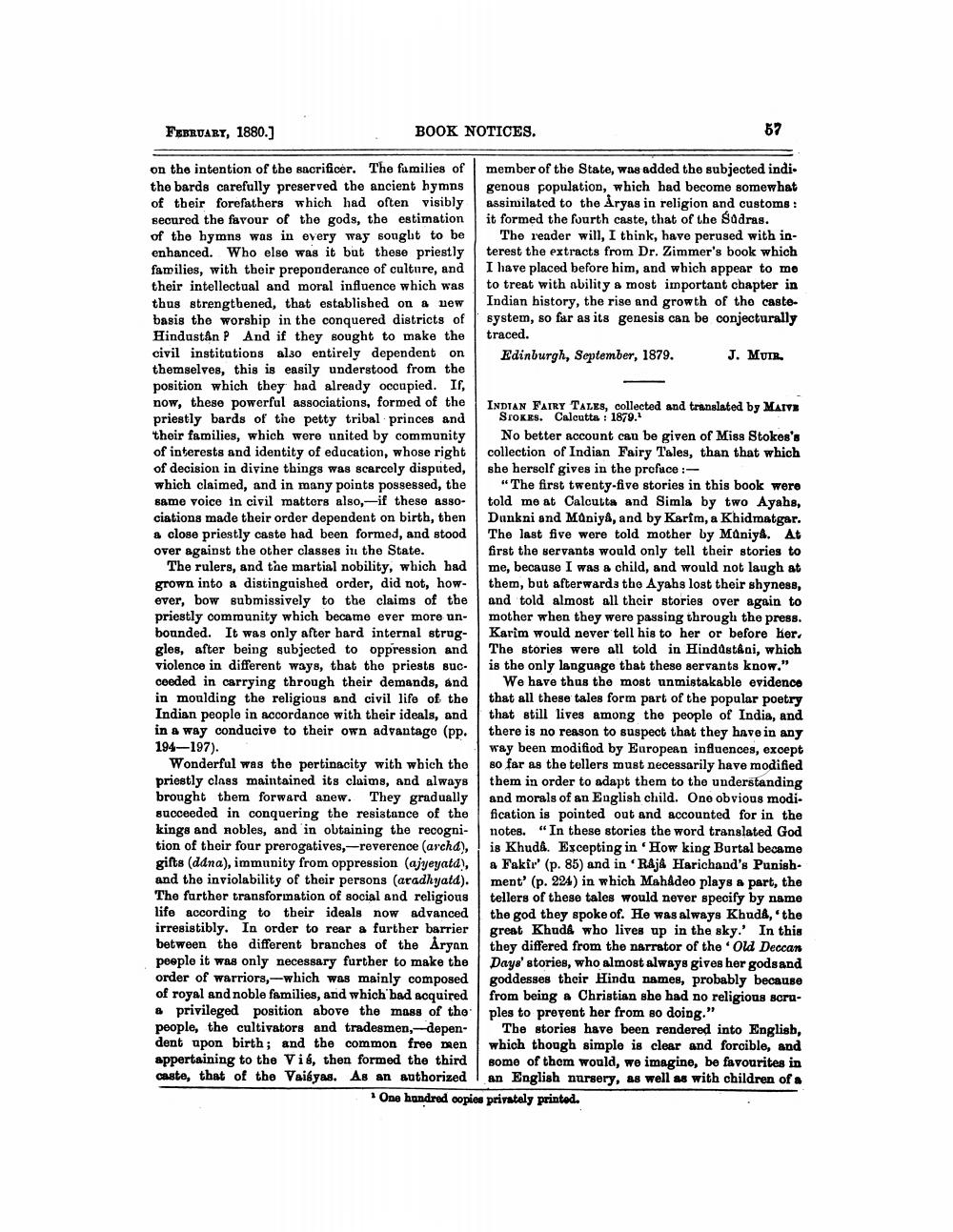________________
FEBRUARY, 1880.]
BOOK NOTICES.
57
on the intention of the sacrificer. The families of member of the State, was added the subjected indi. the bards carefully preserved the ancient hymns genous population, which had become somewhat of their forefathers which had often visibly assimilated to the Aryas in religion and customs : secured the favour of the gods, the estimation it formed the fourth caste, that of the Sadras. of the hymns was in every way sought to be The reader will, I think, have perused with inenhanced. Who else was it but these priestly terest the extracts from Dr. Zimmer's book which families, with their preponderance of culture, and I have placed before him, and which appear to mo their intellectual and moral influence which was to treat with ability a most important chapter in thus strengthened, that established on a new Indian history, the rise and growth of tho castebasis the worship in the conquered districts of system, so far as its genesis can be conjecturally Hindustan P And if they sought to make the traced. civil institutions also entirely dependent on
Edinburgh, September, 1879. J. MUIR themselves, this is easily understood from the position which they had already occupied. If, now. these powerful associations, formed of the INDIAN FAIRY TALES, collected and translated by MAIVE priestly bards of the petty tribal princes and Srokes. Calcutta : 1879. their families, which were united by community No better account can be given of Miss Stokes's of interests and identity of education, whose right collection of Indian Fairy Tales, than that which of decision in divine things was scarcely disputed, she herself gives in the preface :which claimed, and in many points possessed, the "The first twenty-five stories in this book were same voice in civil matters also,-if these asso- told me at Calcutta and Simla by two Ayahs, ciations made their order dependent on birth, then Dankni and Maniya, and by Karim, a Khidmatgar. a close priestly caste had been formed, and stood The last five were told mother by Maniya. At over against the other classes in the State.
first the servants would only tell their stories to The rulers, and the martial nobility, which had me, because I was a child, and would not laugh at grown into a distinguished order, did not, how- them, but afterwards the Ayahs lost their shyness, ever, bow submissively to the claims of the and told almost all their stories over again to priestly community which became ever more un- mother when they were passing through the press. bounded. It was only after hard internal strug- Karim would never tell his to her or before her. gles, after being subjected to oppression and The stories were all told in Hindustani, which violence in different ways, that the priests suc- is the only language that these servants know." ceeded in carrying through their demands, and We have thus the most unmistakable evidence in moulding the religious and civil life of the that all these tales form part of the popular poetry Indian people in accordance with their ideals, and that still lives among the people of India, and in a way conducive to their own advantago (pp. there is no reason to suspect that they have in any 194-197).
Way been modifiod by European influences, except Wonderful was the pertinacity with which the so far as the tollers must necessarily have modified priestly class maintained its claims, and always them in order to adapt them to the understanding brought them forward anew. They gradually and morals of an English child. Ono obvious modi. succeeded in conquering the resistance of the fication is pointed out and accounted for in the kings and nobles, and in obtaining the recogni- notes. "In these stories the word translated God tion of their four prerogatives,-reverence (archa), is Khud. Excepting in How king Burtal became gifts (dana), immunity from oppression (ajyeyatd), a Fakir" (p. 85) and in Raja Harichand's Punishand the inviolability of their persons (aradhyatd). ment' (p. 224) in which Mahadeo plays a part, the The further transformation of social and religious tellers of these tales would never specify by name life according to their ideals now advanced the god they spoke of. He was always Khuda, the irresistibly. In order to rear a further barrier great Khuda who lives up in the sky.' In this between the different branches of the Aryan they differed from the narrator of the On Deccan people it was only necessary further to make the Days' stories, who almost always gives her gods and order of warriors, which was mainly composed goddesses their Hindu names, probably because of royal and noble families, and which bad acquired from being a Christian she had no religious scru8 privileged position above the mass of the ples to prevent her from so doing." people, the cultivators and tradesmen,--depen- The stories have been rendered into English, dent upon birth; and the common free men which though simple is clear and forcible, and appertaining to the Vis, then formed the third some of them would, we imagine, be favourites in Caste, that of the Vaibyas. As an authorized an English nursery, as well as with children of a
*One hundred copies privately printed.




